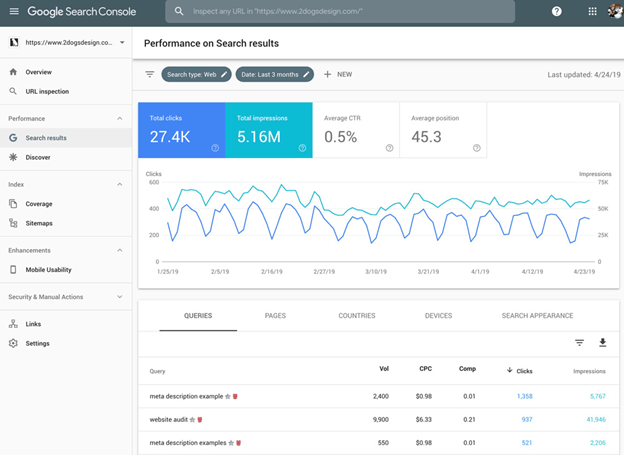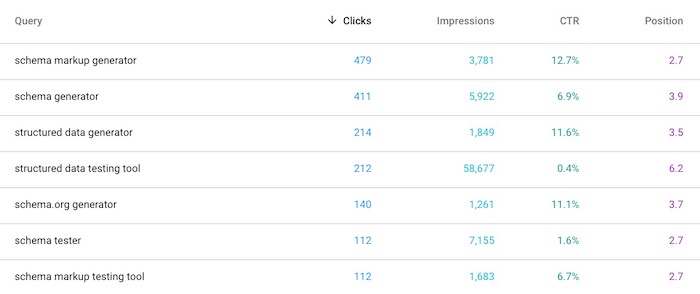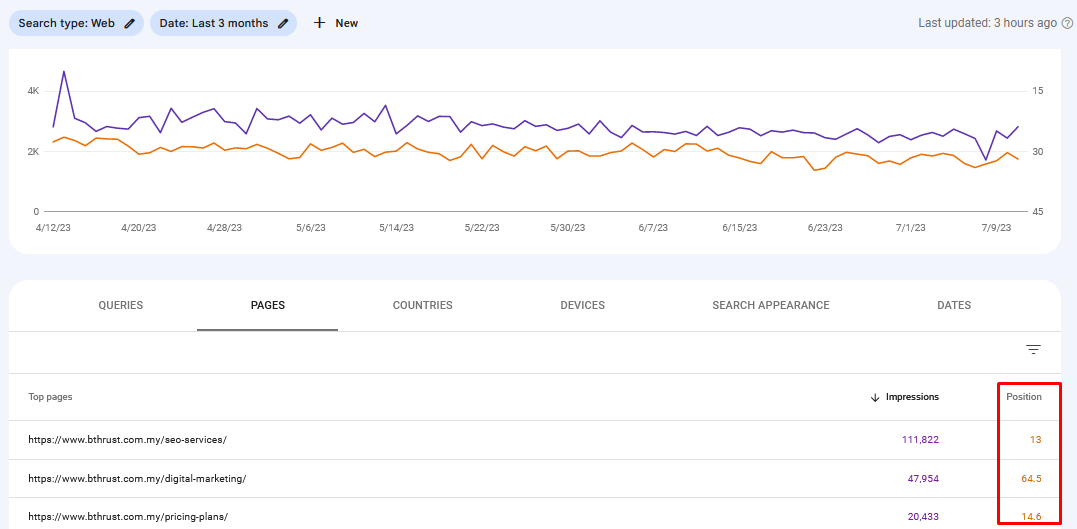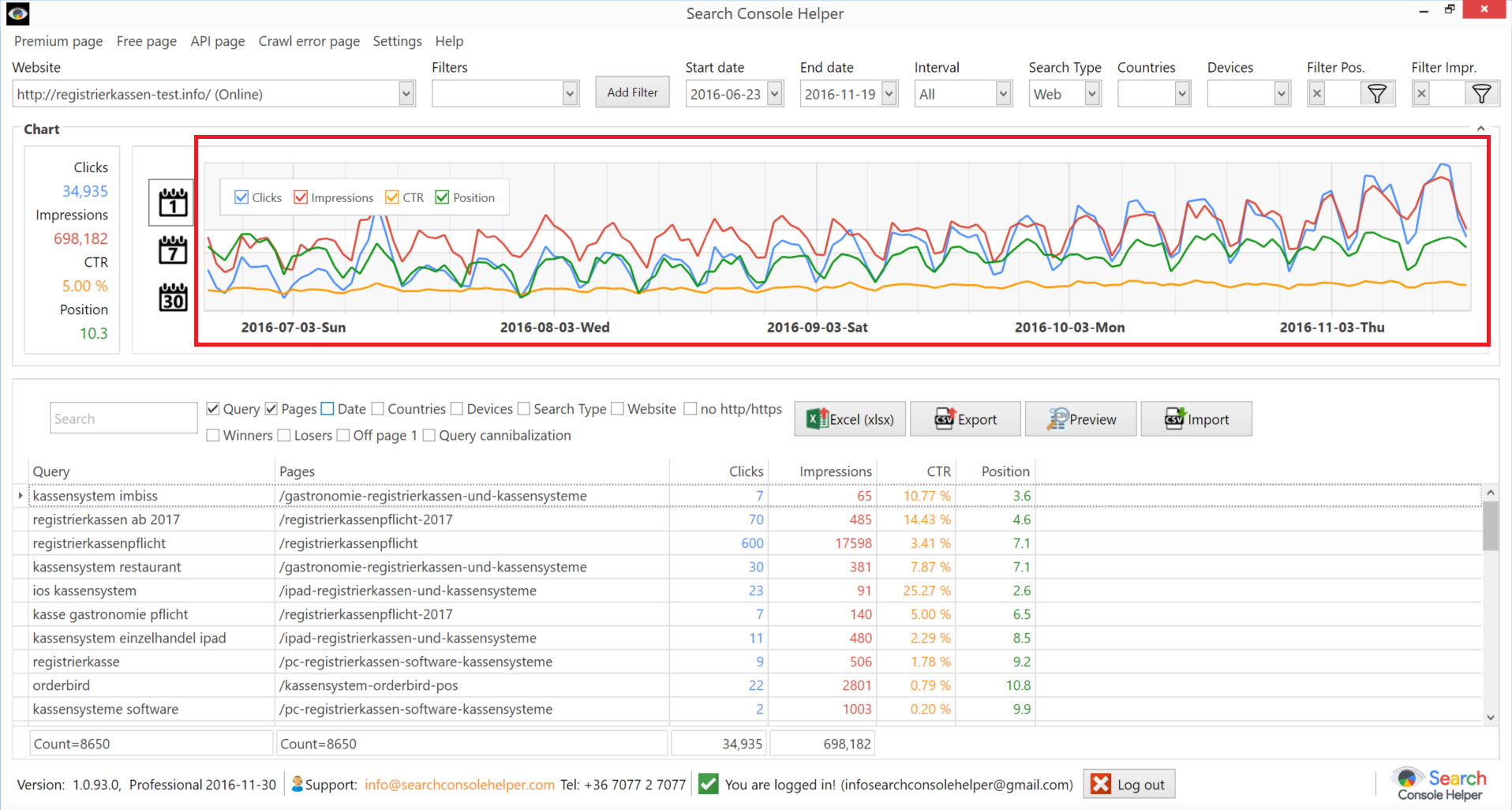


Google Search Console empowers users to optimize keyword rankings by providing insights into search performance, keyword data, & site health. Utilize the Performance report to analyze top queries, impressions, & click-through rates, enabling targeted keyword adjustments. Monitor crawl errors & improve site indexing for better visibility. Leverage the URL Inspection tool to check individual page performance & enhance on-page SEO. Regularly update sitemaps & leverage structured data to increase relevance in search results, ultimately driving higher keyword rankings & organic traffic.
Google Search Console: Optimize Your Keyword Rankings Effectively. Unlock your website's potential with Google Search Console! Discover simple tips to boost your keyword rankings & drive more traffic. Start optimizing today!
Google Search Console (GSC) serves as a vital tool for webmasters & SEO professionals. It allows users to monitor their website's performance in Google search results. By providing insights into search traffic, keyword rankings, & indexing issues, GSC helps optimize strategies effectively. Users can identify which keywords drive traffic to their site, assess click-through rates, & examine impressions. This data aids in refining content & improving visibility in search results. On top of that, the platform delivers alerts for any critical issues, ensuring quick resolutions. Therefore, mastering GSC significantly contributes to optimizing keyword rankings & boosting organic traffic.
The journey of Google Search Console spans several years & numerous updates. Initially launched as Google Webmaster Tools, it evolved to meet changing SEO needs. In 2015, the platform rebranded, adopting its current name. This transformation emphasized Google’s commitment to providing enhanced features for users. Over time, additional functionalities emerged, including mobile usability reports & security issues monitoring. Each iteration aimed at increasing user experience & data accessibility. Today, GSC stands as an essential component for anyone serious about improving their website's search performance. Familiarity with its historical context informs how users approach keyword optimization effectively.
Practical steps for utilizing Google Search Console include conducting keyword analysis & monitoring performance. Begin by accessing the Performance report to identify high-ranking keywords. Analyze pages generating the most impressions & clicks. This data forms the foundation for optimizing existing content. And another thing, leverage the Coverage report to discover indexing problems. Fixing these errors ensures Google can access & rank your pages. And don't forget, using the URL Inspection tool allows examination of specific URLs for issues. Integrating these strategies into your SEO routine leads to improved keyword rankings & organic traffic growth over time.
Using Google Search Console offers numerous benefits for website owners & marketers. First, its comprehensive data provides insights into user interactions with search results. This helps identify which keywords convert. Second, identifying technical issues through GSC allows quick remediation, preventing traffic loss. Third, monitoring backlinks through the Links report offers visibility into site authority. And another thing, tracking mobile usability provides essential information for enhancing user experience on mobile devices. All these features create pathways for optimizing keyword rankings & improving overall site health. Consequently, leveraging GSC leads to sustained success in search engine performance.
Several challenges exist when using Google Search Console effectively. Users may face difficulties interpreting data or understanding specific metrics. Common issues include confusing error messages related to indexing or mobile usability. To address these, Google offers extensive documentation & support communities. Engaging with these resources can clarify uncertainties. Another challenge involves staying updated with algorithm changes & how they influence rankings. Regularly reviewing GSC updates keeps users informed of new features & best practices. By actively seeking solutions & adapting to changes, users can navigate potential pitfalls while maximizing their SEO efforts.
Opportunities for future advancements in Google Search Console are vast. As search engine algorithms become more sophisticated, GSC will likely adapt. Anticipated features may include enhanced data visualization & predictive analytics. Such capabilities would empower users to make informed decisions based on trending data. And another thing, further integration with artificial intelligence could provide automated insights on keyword performance. This would simplify the optimization process for users. As competition intensifies, staying ahead of SEO trends, thanks to tools like GSC, becomes vital. Continuous improvements will ensure Google Search Console remains indispensable for optimizing keyword rankings.
The Google Search Console offers insights to improve SEO. It's free & essential for webmasters. With this tool, you can track your site’s performance. Monitoring keyword rankings enhances online visibility.
Improving your site with this tool can lead to more visitors. It highlights issues affecting ranking. Some common problems include crawl errors & mobile usability. Addressing these can give your site a boost.
Setting up the Google Search Console is straightforward. First, create a Google account if you don’t have one. Then, follow these steps:
After verification, your dashboard will display relevant data. You can monitor clicks, impressions, & much more.
| Verification Methods | Details |
|---|---|
| HTML Tag | Add a meta tag to your site's homepage. |
| File Upload | Upload an HTML file to your web server. |
After setup, analyzing performance data is key. The Google Search Console provides valuable reports. It shows search traffic, keyword rankings, & more. You can see which keywords bring visitors.
This data helps you understand what works. You can adjust your content accordingly. Focus on high-performing keywords to maximize traffic.
Check the Performance Report regularly. This report highlights:
| Performance Metrics | Importance |
|---|---|
| Clicks | Measures how many users clicked your link. |
| Impressions | Shows how often your site appeared in results. |
Identifying effective keywords is crucial for SEO. Use the Google Search Console to find these keywords. Look at your performance reports for insights. Target keywords with high impressions but low clicks.
Such keywords indicate search interest. Be that as it may, your site may not rank well for them. Improve content around these keywords. Enhance relevancy & quality for better ranking.
And another thing, consider user intent. Users search with specific needs. Match your content with their intent. This can increase your chances of ranking higher.
The Google Search Console points out issues impacting SEO. Common issues include:
Address these issues quickly. Crawl errors mean Google cannot access some pages on your site. This limits your visibility. Use the “Coverage” report to address these problems.
Mobile usability is also crucial. Ensure your site is mobile-friendly. The “Mobile Usability” report can show you any issues to fix. Improving these areas can enhance user experience.
| Common Issues | Fixes |
|---|---|
| Crawl Errors | Check the URL & robots.txt file settings. |
| Mobile Usability | Use responsive design & check page speed. |
Improving your click-through rate (CTR) is vital. The Google Search Console shows your current CTR. You can boost CTR by optimizing title tags & meta descriptions.
Ensure titles are engaging & relevant. Use targeted keywords for better visibility. Meta descriptions should be informative. They provide a summary of your content.
Craft compelling descriptions to encourage clicks. Use clear & concise language. Avoid keywords stuffing, as it can lead to penalties.
The Coverage Report is another valuable tool in Google Search Console. It identifies which pages Google can index. You'll find errors & warnings in this report. Pay attention to these details.
Errors may indicate serious problems like broken links or access restrictions. Fix these issues quickly to maintain visibility. Addressing warnings can also be beneficial.
Use this report to ensure all important pages are indexed. Regular checking can prevent sudden drops in traffic. It helps in maintaining a strong online presence.
| Coverage Status | Action Needed |
|---|---|
| Valid | No action needed; page is indexed. |
| Error | Fix & resubmit for indexing. |
Building a strong backlink profile is crucial for SEO. The Google Search Console helps you monitor backlinks to your site. Check the “Links” report to view which sites link to you.
Analyze valuable backlinks to improve ranking. High-quality backlinks signal trust to Google. It enhances your site’s authority. Disavow spammy links that could harm your ranking.
Building new backlinks is also essential. Focus on content that attracts links naturally. Engage with other sites to build relationships. This can lead to more quality backlinks.
Crawling & indexing are vital for your site’s visibility. The Google Search Console provides insights here. Use the “URL Inspection” tool to check individual URLs. This shows if Google has indexed your pages.
New content needs to be indexed promptly. Submit URLs manually to expedite the process. Understanding how Google sees your site can help in optimizing it.
Keep an eye on index status. Regular checks help avoid unexpected drops in visibility. A marked increase in indexed pages can also signal effective optimization efforts.
| Inspection Tool Features | Benefits |
|---|---|
| Live Test | Check if a page is indexed immediately. |
| Request Indexing | Submit new URLs for quick indexing. |
The Mobile Usability Report is crucial today. More users search using mobile devices. The Google Search Console helps ensure your site is mobile-friendly. Check for issues affecting mobile usability regularly.
Common problems may include small touch elements or insufficient viewport settings. Fix these issues to improve user experience on mobile. A mobile-friendly site attracts more visitors & improves ranking.
Mobile optimization also affects loading speed. Use tools to analyze & enhance speed. Ensure that your site remains accessible & useful for mobile users.
Rich results can enhance your appearance in search results. They provide more context about your content. The Google Search Console helps monitor rich results performance. Use the “Enhancements” section for insights.
Structured data is essential for rich results. Implement it correctly to reap benefits. Examine your site for rich result eligibility. Adjust your markup to improve visibility.
This enhancement can significantly boost CTR. It draws attention to your listing in search results. Strive for rich snippets to stand out from competitors.
| Rich Result Types | Examples |
|---|---|
| Recipes | Show cooking times, ratings, & ingredients. |
| Events | Display date, location, & time of events. |
Regular reporting is key. Use Google Search Console insights to adjust your strategy. Monthly reviews help track improvements & setbacks. Analyze performance metrics continuously.
Adjustments should be based on data trends. If certain keywords lose performance, investigate. Look at competitors & market changes for insights. Regular adjustments can keep your site relevant.
Creating an action plan based on reports can be beneficial. Set specific goals for SEO efforts. Monitor progress towards these goals consistently.
Understanding competitors helps refine strategy. Use the Google Search Console to conduct a competitor analysis. Examine what keywords they rank for. Identify gaps where you can improve.
Consider using external tools for deeper insights. Tools like SEMrush or Ahrefs can be beneficial. Analyze their content strategies & backlink profiles.
Learning from others can lead to better optimization practices. It helps identify successful strategies you can adapt.
Google updates its algorithms regularly. Staying informed is essential for maintaining rankings. The Google Search Console can help track changes in traffic. Watch for sudden drops which may indicate algorithm shifts.
Adapting to these changes promptly can mitigate impacts. Regular SEO audits can reveal areas needing improvement. Focus on content quality & user experience to align with best practices.
Being proactive can keep your site competitive & relevant. Monitor announcements on algorithm changes from Google frequently.
“Always be ready to adapt your SEO strategies based on current trends.” - Mrs. Frida Reinger
The Search Appearance reports show how your site appears in search results. The Google Search Console provides insights on rich results, AMP pages, & more. Analyzing these reports helps enhance your visibility.
Ensure your site meets requirements for enhancements. Implement necessary markup for structured data. Understanding how users see your site can guide your optimization efforts.
Regular monitoring of these reports keeps your strategy relevant. It helps identify what works & what doesn’t in terms of appearance in search results.
| Search Appearance Type | Details |
|---|---|
| Rich Results | Includes additional information, making it stand out. |
| AMP Pages | Accelerated Mobile Pages designed to load quickly. |
Continuous learning is crucial for effective use of Google Search Console. Follow SEO blogs & updates from Google. This knowledge helps implement best practices quickly.
Consider joining SEO communities. Engage with other professionals to share insights. Networking can provide additional resources & support.
Integration with Google Analytics can enhance your analysis. Link your Google Search Console account to Google Analytics for richer data. This provides a comprehensive view of your web performance.
Tracking user behavior alongside performance metrics can reveal deeper insights. You can understand which keywords drive traffic, then track user engagement.
Utilizing both tools will significantly enhance your SEO strategy. Analyze data together to maximize your optimization efforts.
| Benefits of Integration | Details |
|---|---|
| Comprehensive Analytics | Combined data provides a full picture of user engagement. |
| Improved Decision Making | Data-driven insights help shape SEO strategies. |
Backing up data from Google Search Console is essential. Export reports regularly to maintain access to historical data. This practice can help track changes over time.
Data backups assist in analyzing long-term performance. They provide insights for future adjustments & help in identifying trends.
Maximizing the potential of Google Search Console ensures effective SEO strategy. This tool is key to optimizing keyword rankings & improving visibility. Regular analysis & adjustments are crucial for climbing search rankings.
Engage with the tool consistently. Review metrics & reports to refine your strategies as needed. Remaining proactive is the best way to stay ahead in SEO.

Many website owners look for ways to improve their keyword rankings. This post covers how to use Google Search Console. The goal is to rank higher in search results. Understanding this tool is key for better online visibility.
Google Search Console is a free tool. It helps webmasters monitor & optimize their sites. You can check how your site appears in Google search results. Users can also analyze the traffic they get. This platform connects you to Google. It provides insights on indexing, crawling, & ranking. The tool highlights potential issues on your site.
With these functions, you can improve your visibility. Using Google Search Console is crucial for any site. It helps identify areas of enhancement. You can see which keywords your site ranks for. This data is essential.
Setting up this tool is straightforward. First, create a Google account if you don't have one. Then follow these steps:
Once your site is added, you can explore its features. You can monitor performance quickly. Daily insights are available. This setup ensures you make the best use of the tool.
The performance report is the heart of Google Search Console. It displays essential information about your site. You can see impressions, clicks, & average position. This data helps you assess your current keyword performance. Review which keywords bring visitors to your site.
| Metric | Description |
|---|---|
| Impressions | How often your site appears in search results. |
| Clicks | The number of times users click on your site. |
| Average Position | Your site’s ranking for specific keywords. |
By analyzing these metrics, you make informed decisions. You can adapt your SEO strategy. Focus on keywords that need improvement. This boosts your chances of higher rankings.
Keywords play a vital role in SEO. Use Google Search Console for effective keyword research. It shows which terms drive traffic. Evaluate the click-through rate (CTR) for each keyword. This metric indicates how often people click your link.
Keyword optimization is essential. Use relevant terms in your content. Write compelling meta titles & descriptions. This encourages users to click on your link. Your goal is to match user intent.
Indexing issues can harm your keyword rankings. Fortunately, Google Search Console helps identify these problems. Visit the "Coverage" section. You will find issues like "Submitted URL not found" or "Redirect error".
| Error Type | Action to Fix |
|---|---|
| 404 Errors | Redirect to a relevant page or create a new page. |
| Server Errors | Contact your web hosting provider. |
Fixing these issues will enhance your rankings. Regularly check for indexing problems. This helps you maintain a healthy website.
Sitemaps guide search engines to your important pages. It is wise to submit a sitemap in Google Search Console. To do this, navigate to the "Sitemaps" section. Enter your sitemap URL, & click submit. This process helps Google efficiently crawl your site.
Submitting sitemaps can improve indexability. It signals to Google about content changes. Timely updates ensure your new content is indexed quickly.
Backlinks are vital for SEO success. They signal authority to search engines. Use Google Search Console to monitor your backlinks. In the "Links" section, view your top linking sites & the most linked content. This data helps gauge your domain strength.
| Linking Site | Anchor Text |
|---|---|
| example.com | Best SEO Tips |
| anotherexample.com | Web Optimization |
Analyze this information. Identify which sites link to you. Reach out for more link-building opportunities. Quality backlinks can boost your metrics significantly.
Mobile usability is crucial. Many users search from mobile devices. Use Google Search Console to audit mobile-friendly pages. Check the "Mobile Usability" report. This section shows any mobile-related issues like clickable elements. Fix these to enhance user experience.
Improving mobile usability can increase your rankings. Google prioritizes mobile-friendly sites.
The URL Inspection Tool helps you check specific pages. You can get detailed information about any URL. Input your URL into the tool for analysis. It shows the last crawl date & index status. You can also request indexing for new content.
| Data Point | Description |
|---|---|
| Coverage Status | Whether the URL is indexed. |
| Last Crawled | Date of last Google visit. |
This tool is essential. Update your content, & request indexing. Keep Google informed of your site changes.
"Using tools like Google Search Console, we can optimize keyword rankings effectively." – Gustave Walter
Look at keyword trends over time using Google Search Console. It shows performance over various periods. Use this data for strategic planning. Identify seasonal trends & adapt your content accordingly. This approach improves visitor engagement.
This analysis is powerful. Optimize your site as trends shift. Stay updated on what users search.
CTR is crucial for keyword rankings. A higher CTR indicates relevance. Use reports to find low-performing keywords. Improve titles & descriptions. Make them compelling. Always align them with the user’s intent.
| Action for Improvement | Expectation |
|---|---|
| Rewrite meta titles | Increase clicks significantly. |
| Use action-oriented language | Improve user engagement. |
Focusing on CTR can elevate rankings. Test & refine your approaches regularly.
My experience with Google Search Console has been enlightening. I started using it for my blog. Initially, I was confused about its features. Be that as it may, exploring it revealed how useful the data could be. I optimized my site based on keyword performance. It helped increase my traffic effectively.
Continuous optimization is key. Regularly check your Google Search Console data. Look for any drops in traffic. Address issues right away. Keep your site updated with fresh content. This practice helps maintain or improve your ranking.
Staying proactive is essential. Optimization never ends. Invest time in checking the platform regularly.
Integrating Google Search Console with Google Analytics can yield deeper insights. Connecting both accounts allows you to gain additional information. You can see metrics like user behavior. This data helps tailor your content for audience needs.
| Benefit of Integration | Details |
|---|---|
| Align SEO Efforts | Connect traffic sources & user engagement. |
| Better Decision Making | Make data-driven choices using combined data. |
Use this integration wisely. It allows for a rounded approach to SEO. Check various reports to adapt strategies.
Search engine algorithms change often. Staying updated is critical. Google Search Console offers hints on how these changes affect rankings. Monitor performance after updates. Adjust your SEO strategies accordingly. This practice keeps your site competitive.
Being aware of trends is vital. Proactive adjustments will yield benefits.

Google Search Console is a free tool provided by Google that helps website owners monitor & optimize their site's presence in Google search results. It offers insights into how Google views a site & provides data for improving visibility & performance.
To add your website, sign in to Google Search Console & click on the "Add Property" button. Enter your website's URL & follow the verification steps to confirm ownership.
You can access data related to search performance, indexing status, mobile usability, security issues, & many more aspects that can help improve your website's rankings.
In the Performance report, you can see how often your website appears in search results, which keywords drive traffic, & the average position of these keywords.
A sitemap is essential as it helps search engines understand the structure of your website & find all relevant pages. Submitting a sitemap can enhance indexing & assist in improving rankings.
The Coverage report highlights issues related to indexing, while the Mobile Usability report points out problems affecting mobile users. These insights can help you address any obstacles to performance.
If your site is not indexed, check the Coverage report for errors, ensure your pages aren't blocked by robots.txt, & resubmit your sitemap to prompt re-indexing.
Yes, by analyzing the Performance report, optimizing underperforming keywords, & making necessary changes based on the data provided, you can improve your keyword rankings.
It's recommended to check Google Search Console regularly, at least once a week, to stay updated on any issues, performance changes, & potential improvements.
Search appearance features are enhancements in search results, such as rich snippets & featured snippets, that can increase visibility & click-through rates for your pages.
You can use the URL Inspection tool to submit individual URLs for indexing. Just enter the URL, then click "Request Indexing" to prompt Google to review the page.
Core Web Vitals are a set of specific factors that Google considers important for user experience. They focus on loading performance, interactivity, & visual stability, influencing rankings.
Review the specific error messages in the Coverage report, take appropriate corrective actions, then validate the fixes through the Search Console interface to ensure they are resolved.
Mobile usability is crucial as Google prioritizes mobile-friendly sites in search rankings. Ensuring a responsive design can significantly impact your site's performance on mobile search.
You can evaluate performance through the Performance report, which shows metrics like clicks, impressions, average position, & click-through rate (CTR). Analyzing these can indicate overall health.
To improve CTR, optimize your page titles & meta descriptions, ensure they are compelling & relevant, & consider using schema markup to enhance appearance in search results.
Yes, the Links report in Google Search Console shows the domains linking to your website, the specific pages receiving links, & the total number of links.
🎉 Biggest Black Friday Deal Ever!
MASSIVE 80% OFF
Unlock unlimited AI power across every plan.
Offer Ends In:
Ends December 10
Use Code: BLACKFRIDAY80